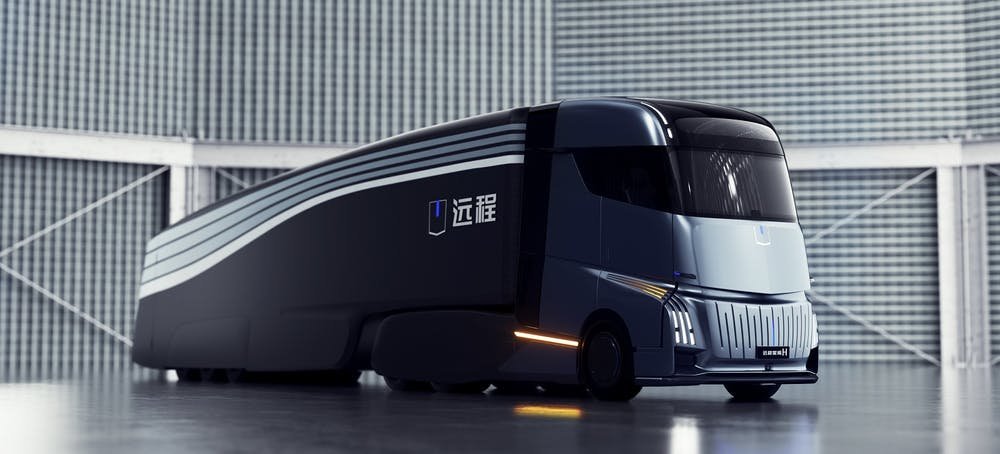
China’s Geely has created a prototype next-generation, “smart energy” heavy-duty commercial vehicle that can run on an electric charge or as a methanol hybrid.
And until it can drive by itself, the Asian industrial giant that plans to produce this futuristic tractor-trailer is making the cab into a home-away-from-home, complete with a bathroom, mini-kitchen, and washer-dryer.
A prototype for the Homtruck, which appears to rival the U.S-developed Tesla Semi—in appearance and promise—also is being built with more driver comforts in mind, according to photos and details released by Geely Holdings Group.
Created under the Farizon Auto nameplate, the Farizon Homtruck’s parent company has goals to make it available beyond China.
It would begin production in 2024, according to Geely. When Telsa unveiled its futuristic-looking Tesla Semi in 2017, it also made bold promises to transform the heavy-duty trucking industry with a battery-electric tractor-trailer available to fleets by 2019. Four years since that launch, production is yet to begin.
Mike Fan, Farizon’s CEO, told CNBC last week that the OEM would target fleet customers in North America, Europe, Korea, and Japan. “This product is designed and developed facing the global market,” he told the channel.
“Farizon Auto’s Homtruck is the result of the synergies between Geely Holding’s technological expertise and its partners in the global automotive industry,” Eric Li, Geely’s chairman, said this week. “The Homtruck represents a significant move towards a net zero-carbon freight transportation system and opens the door to a new era for the logistics industry.”
Unlike the Tesla Semi, the Homtruck prototype doesn’t purely rely on battery-electric power. Homtruck’s architecture offers various powertrain options—including a range extender, methanol hybrid, and pure electric with battery swapping option, based on government standards recently released by China’s Ministry of Industry and Technology.
These options, according to Geely, would allow the Homtruck to be recharged at highway service stations “in minutes rather than a substantial amount of time.”
Battery swapping and hybrid power could be key to making battery-electric trucks work for long-haul trucking in the U.S and Asia. Because it takes so long to charge a vehicle battery, most North American truck makers have turned their BEV attention to regional haul.
In China, the Geely Technology Group is working to create a national battery swapping standard. It plans to deploy 5,000 battery swapping stations in 100 Asian cities by 2025.
The group has about 100 active battery swapping stations for passenger cars in China, which the company said can change batteries in 59 seconds using automated technologies.
In a separate announcement this month, Geely announced plans to scale up this battery-swapping service as more BEVs come on the market in China.
Geely holds 200 patents in methanol fuel technologies and claims to be the only mass-producer of methanol-powered vehicles. In 2022, the Asian industrial giant plans to launch the “Leishen Methanol Hybrid Engine.”
Inside the Homtruck’s cabin, designers focused on soft-touch fabrics, sustainable plastics, and bamboo grain materials to create “a healthy eco-friendly environment inspired by the peaceful bamboo forests of China.”
Zhejiang Geely Holding Group Co., the official name of the Chinese multinational automotive company, is a privately held corporation based in Hangzhou, Zhejiang province. The company's main focus has been on various passenger vehicle brands it sells in Asia and Europe. The company sold more than 2 million cars in 2020.